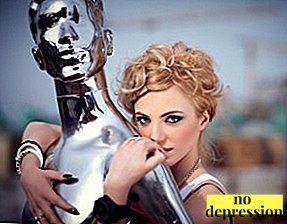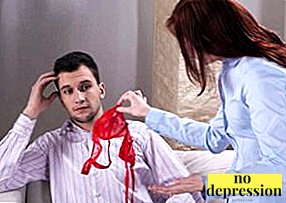The fact that there are attacks of severe anxiety, people living in our time, have learned recently. Many, suffering panic attacks, still do not know about the causes of the painful reaction. But 10% of our contemporaries suffer from sudden bouts of fear, that is, every tenth of our friends are subject to such painful phenomena.
Symptoms of panic attacks.
Fear usually arises without cause, sometimes under the influence of minor events. They can be loud sounds, the cry of people around them, and sometimes - ringing silence.
Panic attack begins immediately and is accompanied by unpleasant sensations, such as:
- Increase or decrease in pressure
- Feeling hot or feeling cold
- Heart pain, tachycardia
- Strong weakness, sometimes it seems to a patient that he will faint
Typical for panic attacks are tremor, loss of orientation in space and time. The patient understands that he cannot concentrate on anything except his own feelings. Anxiety is constantly increasing. At such times, processes of our body that are not controlled can manifest themselves - vomiting, uncontrolled excretion of urine, feces. Suffering from vegetative crises describe their condition as a feeling that their body is empty. It seems to people that they leave the physical shell and feel themselves as disembodied creatures. The feeling of fear, panic accompanies all these symptoms. The desire to escape and escape becomes overwhelming.
A state of severe anxiety can last several minutes, and sometimes even half an hour.. Upon completion of this, the feelings and sensations stabilize, the heart still hurts for a short time, muscle pain and nervous condition persist, sleep is disturbed.
Often a person is afraid that others see external manifestations of panic, and his opinion about him is not changing for the better. It seems to him that people consider him cowardly and worthless. Thoughts that he looks stupid, fill his whole being, provoking the re-development of the panic state. This is how the “closed circle” appears - the fear that fear will arise again.
Every person suffering from the states of panic crises feels them in his own way. And it is not at all necessary that the above symptoms appear to you.
Symptoms of panic attacks, which are described above, usually occur in patients with a particular nervous system, having a suspicious, disturbing nature. These people have high levels of stress hormone in their blood.
The nervous system disorder develops according to this type:
- Single manifestations of severe panic →
- Attacks occurring more often, but with new symptoms →
- Panic fear for own health, which is present all the time →
- Rituals are formed that help to avoid frightening actions (patients no longer ride in the elevator, leave the house) →
- Joining depression (sleep is disturbed, appetite is lost, mood goes down).
Attacks of severe anxiety tend to disguise themselves as some other diseases. A person who has recently become ill and does not know about his diagnosis often goes to the hospital, turning to different doctors. But only a psychiatrist can distinguish a mental disorder from some other diseases, for example:
- Neurological disorders (organic brain disease, vestibular disorders).
- Somatic diseases (atypical manifestations of certain diseases).
- Mental disorders (neurosis, hypochondria, sluggish schizophrenia).
Causes of panic attacks
For the occurrence of severe anxiety disorder, a sharp impact of any one factor or the accumulation of several is sufficient. The first attack attacks cause the following reasons:
- Stress.
- Difficult life situations.
- Chronic fatigue.
- Use of psychoactive substances.
- Many mental and somatic diseases.
Very often, the first attack occurs in adolescence, in pregnant women, as well as after the appearance of the child, in menopause (against the background of changes in the hormonal background). These are external prerequisites. In order for a panic condition to manifest, internal prerequisites are needed. These are somatic diseases, alcoholism, drug addiction, and neuropsychiatric disorders.
Panic attacks do not appear on their own, their causes are in the occurrence of any deviations in the state of health, which gives rise to the occurrence of anxiety attacks. Not without reason, in ancient times, such states were considered manifestations of vascular dystonia.
Treatment of panic attacks.
Stages of treatment and diagnosis:
- Reception and further treatment by a psychiatrist.
- Receptions by specialists: a neuropathologist, an endocrinologist, a therapist, a cardiologist.
- Prevention of anxiety attacks, as well as hypochondria, depression.
- Preventing recurrence of the disease.
For treatment, it is necessary to select an adequate drug therapy. You can take antidepressants, tranquilizers. They are used not only in the case of emergency, but also for long-term therapy.
Panic attacks, treatment:
- Psychotherapy (hypnosis),
- Physiotherapy,
- Physiotherapy.
If the diagnosis is made correctly, the cure of anxiety attacks gives a good result and prevents useless walking on the doctors. With the right approach to treatment in 90% of cases, a persistent remission occurs.
People who have known the effects of anxiety attacks are advised by psychologists to focus on their positive qualities. In each of us there are many positive qualities. For this we must value ourselves, respect and love. Do not stop working on improving self-esteem and accepting yourself as you really are. Change negative thoughts to positive ones and over time, unpleasant symptoms will disappear on their own.
We also offer to go depression test on our website or its alternative - Beck Depression Test.



